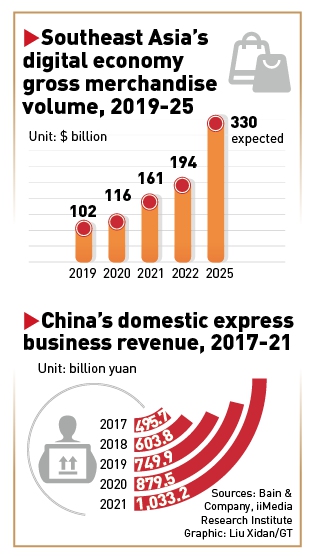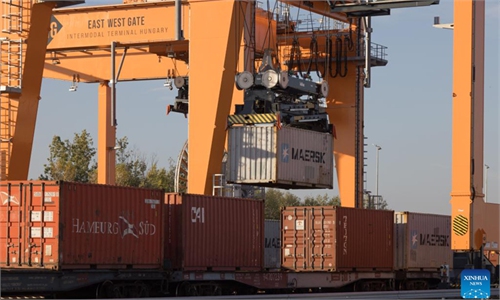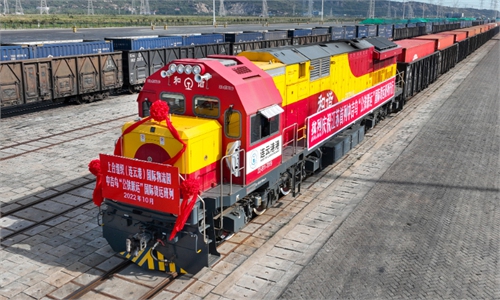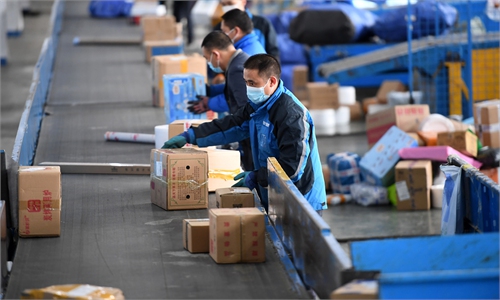China’s express giants facilitate business expansion in ASEAN members amid stronger trade ties
Industry players focus on ASEAN members amid stronger trade ties

A worker drives forklift at warehouse. Photo: VCG
Chinese express conglomerates are facilitating business expansion overseas, with members of the Association of Southeast Asian Nations (ASEAN) being the major destination, amid wide expectation for a stronger regional cooperation for a more stable and secured supply chain.While the demand for logistic services has weakened across the globe, ignited by the high inflation, the momentum toward overseas market expansion by Chinese industry players has accelerated, particularly across ASEAN, where greater opportunities are available, driven by stronger multilateral trade and the fast development of cross-border e-commerce between China and the regions, under the Regional Comprehensive Economic Partnership (RCEP).
Leveraging on the trend, recently domestic express giant SF Express has made frequent moves targeting the Southeast Asian market, with the company announcing in late October the launch of a big promotion for Thailand shipping available to newly signed monthly account customers.
This came just weeks before the company launched its promotional services for cross-border delivery services to countries such as Singapore and Malaysia at discounted prices, indicating its rising momentum for achieving growth across Southeast Asian markets.
In addition, SF Express and Kerry Logistics have established the KEXI (Kerry Express International) committee in Thailand, which is expected to help SF Express expand across the Southeast Asian market while developing talent in overseas markets.
Express companies such as Cainiao, Alibaba's logistics branch, have also established warehouses in Southeast Asia and opened up special aviation lines across the region.
There is strong momentum behind Chinese express companies continuing to go global. Southeast Asian regions where the trade and economic ties are often closely tied with the Chinese market represent a stepping stone for global expansion, Bai Ming, deputy director of the international market research institute at the Chinese Academy of International Trade and Economic Cooperation, told the Global Times on Monday.
"The Chinese express industry started earlier in the region accumulating valuable experience, which enables them to gain foothold in the region, particularly in business to customer sectors where one-stop service is required," Bai said.
Booming opportunities
Why do express delivery companies view Southeast Asia as their "first stop" in expanding overseas?
Experts said that Southeast Asia has not yet formed a mature and complete logistics system in terms of geographical location and cultural environment, compared with Europe and the US, which have a century-old logistics development history and mature logistics companies.
The corresponding market opportunities in the region are huge and yet to be fully explored, especially by Chinese companies, under the strengthened China-ASEAN trade ties, which is reflected on the positive trade figures, the RCEP and a new round of upgrade of the China-ASEAN Free Trade Area, Bai said.
The scale of China-ASEAN trade has expanded by more than 100 times in the past 30 years. In the first 10 months of this year, ASEAN continued to remain China's largest trading partner.
In the first 10 months of this year, China's imports and exports to other RCEP members increased by 8.4 percent year-on-year, and imports and exports to ASEAN accounted for 15.2 percent of China's total foreign trade, data recently released by the General Administration of Customs revealed.
The double-digit growth on trade volumes mirrors the strong momentum for the development of e-commerce market in which express companies play its part.
Market research firm Ebrun predicted in its report released on November 11 that the e-commerce market in Southeast Asia will grow from $120 billion in 2021 to $234 billion by 2025.
About 50 percent of the surveyed cross-border e-commerce related export enterprises have only launched cross-border overseas business in Southeast Asia in the past three years, according to the report, indicating significant potential for Chinese firms.

Graphic: Liu Xidan/GT
Strong partnerships
The rich experiences of Chinese industry players, which are taking the lead in the whole region, can provide supports in boosting local underdeveloped e-commerce industry, Bai said.
One emerging trend in the market expansion among Chinese express companies is through strengthening business partnerships with local companies based on win-win cooperation.
For example, Cainiao has built the largest automated warehousing system in Southeast Asia, helping Flash Express, a leading express delivery company in Thailand, quickly establish differentiated competitiveness in the field of logistics and warehousing, and further expand its leading edge in the industry, the Global Times learned from Cainiao.
"The overall level of Thailand's logistics, especially e-commerce logistics, is about 5 to 10 years behind China's. Only some large logistics companies use some semi-automated warehousing systems. Most small and medium-sized warehouses still use manual bookkeeping," Han Lei, warehouse manager of Flash Express, told the Global Times, indicating a big gap that the Chinese express company can help to narrow for its business partner in Thailand.
Another good example is SF Express' acquisition of shares in Kerry Logistics targeting business expansion in the region.
Kerry Logistics has an overseas local express delivery networks in Thailand, Vietnam, Malaysia, Cambodia, Indonesia and other Southeast Asian countries. The synergy and integration with Kerry will accelerate SF's international layout, SF Express said in a statement sent to the Global Times on Monday.
Through cooperation, flowers or matsutake from Yunnan can be delivered to Singapore within 20 hours at fastest through SF International, the company said.
In the future, SF International hopes that Chinese users can enjoy the same high-efficiency, convenient and high-quality services as domestic SF Express when delivering to Southeast Asia.



